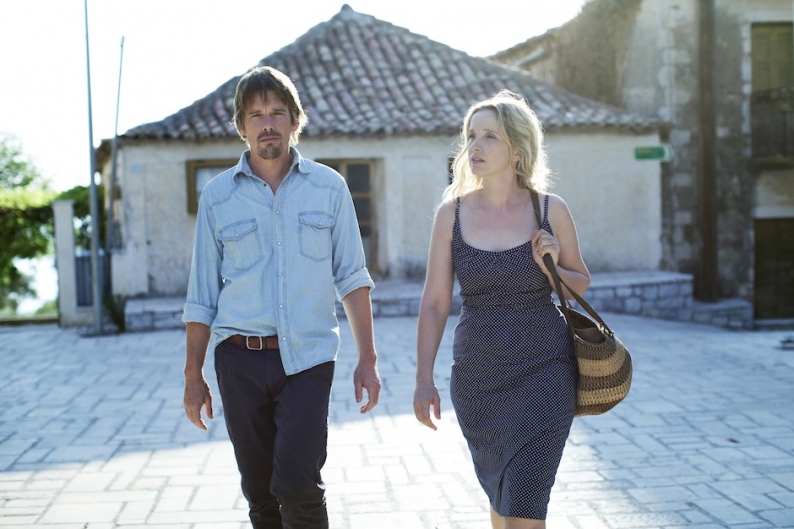At the end of SPIN’s Sundance stay, we spotted some unexpected similarities between very different projects: color played a symbolic role in several hyped releases, and someone masturbated in a sleeping bag while in the presence of other people in not one, but two movies. But Richard Linklater’s much-anticipated Before Midnight included neither. It was one of the best films we saw and the strongest in the series. Granted, its core fan base has aged along with Jesse (Ethan Hawke) and Celine (Julia Delpy), making it more poignant by default, and the probing questions of the comfortably upper-middle class are a favorite Sundance subject: Can romantic love last? Why do we have kids? Are we really happy? To refresh the memory of those who haven’t watched 2004’s Before Sunset in a while: Jesse was last seen in Paris, having bumped into Celine during a press tour for a book that recounted their first meeting, and it looked like he was going to miss his flight home to his wife and son in order to stay with her. (If you don’t want to know what happened yet, do not read any further.)
Jesse missed the flight. He and Celine spent weeks making up for lost time, he divorced his wife, whom Celine here refers to as “an alcoholic cunt,” he moved to Paris, and they (accidentally) got pregnant with twin girls. Jesse only sees his son Hank a few times a year, and the movie opens with the two of them saying goodbye at an airport in Greece, where Jesse has spent the summer with his family on a writer’s retreat. The car ride back to the house suggests a happy but much-less-fresh relationship, and they bicker pleasantly about Celine’s new job offer — until Jesse starts feeling regretful about how little he sees his son. Celine immediately rings the alarm: “This is how it starts.” For the rest of the day, she’ll be convinced that Jesse is angling to move back to the States, and in the process, expecting her to sacrifice the government position that she at first sounded ambivalent about, but in the throes of an uncomfortably realistic third-act fight becomes her “dream job.”
So Celine and Jesse continue the introspective conversation that has defined the previous two movies, occasionally in the company of some European friends. Sure, some of it is pretentious, but nobody thinks otherwise, and the dialogue is both revealing and kind of sad. Celine, always the more cynical of the two, works in little digs about the male sexual appetite and seems slightly fatigued by Jesse’s literary success. Other couples at the dinner table talk of their breakups as though they are inevitable, and one widow concludes: “We appear and we disappear, and we’re important to some, but we’re just passing through.” The overwhelming beauty of the day slowly gives way to the night as Jesse and Celine head to a hotel for a romantic evening that gets sidetracked by almost a decade’s worth of resentment, complaints, insecurities, and experiences. Linklater and his cowriters/actors execute the argument perfectly; the insults exchanged are familiar, mordant, and funny. Before Midnight leaves you both shaken and satisfied, and these characters have evolved to the point where everyone will probably want to check in with them again in another nine years.
Another favorite was Upstream Color, which is a much more curious, impossible-to-define film. Director Shane Carruth took the stage after the premiere and described it as “vastly better” than his 2004 Primer, the complex time-travel indie that won the Grand Jury Prize at Sundance. With Color, Carruth says, “I wanted to break people apart and have them build up their own identities and narratives based on what they found around them, where they had some moment where they wake up and see that they’ve done something that they can’t quite atone for.” The story is as ineffable as his ambition would suggest, and I would need to see it multiple times to be able to make sense of my notes, but it focuses on a young professional named Kris (writer/director Aimee Seimetz) who is abducted, hypnotized, robbed, and infected with a parasite. The organism synchronizes Kris with her environment, specifically a pig on a farm faraway; she is drawn to Jeff (Carruth) without knowing why, and the two begin to argue over whose memories are whose. Carruth says this is what would traditionally be “the meet-cute part of the film, but it’s actually torture” because the characters are affected by something beyond their control. Until Carruth pointed it out, I had failed to notice that the last third of the film was mostly silent, except for the recitation of passages from Thoreau’s Walden, which he chose because he “didn’t at first like [it], and thought it would be perfect for hypnotizing someone.” The shots are tactile and vibrant: soil, flowers, ice cubes, bedsheets — everything is rich in detail. With a tense, minimalist score composed by Carruth himself, Color is a truly unique story, one that you don’t follow so much as allow it wash over you, in the words of one Sundance curator.
Going in to the festival, Stoker looked pretty intriguing, but the English-language debut of Korean director Chan-wook Park didn’t quite live up to the hype of his vengeance trilogy, maybe because there wasn’t as much vengeance. The set-up was promising. India (Mia Wasikowska) plays a loner with a Wednesday Adams vibe: she’s buttoned-up in prim dresses and runs around in saddle shoes, the footwear of a serious and stunted 18-year-old, and of course she’s smarter than all the adults around her. When her father dies on her 18th birthday, his brother (Matthew Goode) shows up out of nowhere, with a placid smile and tanned features that attract the attention of India’s distant mother (Nicole Kidman). Uncle Charlie solicits an invitation to stay—what’s the deal with this guy? Is he, as the title would suggest, a vampire? India vacillates inconsistently between wariness and fondness for him; at one point, they play an arousing Philip Glass duet, a sudden sexual connection that’s never fully explained (although incest isn’t a new subject for Park). Meanwhile, Kidman’s Evie sashays around the house, oblivious and listening to Nancy Sinatra’s seductive “Summer Wine.”
What the plot lacks in logic, it makes up for in set design. During the Q&A afterwards, Park was compared to Hitchcock, and Stoker featured a good deal of visual distraction: an overhead light swings ominously on the way to a gruesome discovery; the camera cuts between the opening of an icebox and the lid of the piano. (But in this isolated setting, the well-framed shots and bold colors — fans of How I Met Your Mother might notice the yellow umbrella — are somewhat reminiscent of Kubrick.) Park, speaking through a translator, was humbled by the comparison, saying he had been approached to direct Hitchcok, and was especially disappointed after seeing it that he hadn’t done so (not sure if this was meant enviously or critically, but Park seemed too good-natured for an insult). He was deferential to his cast, who were just as complimentary in return. Kidman said she was a fan of Oldboy and Thirst, and that her “biggest fear was whether something would get lost in translation,” but that she felt Park “held [her] by the hand.” Wasikowska added, “He has his own vision, which is rare in modern filmmaking,” and Goode was grateful to his friend Colin Firth, who had to pass on the role, and called Park a genius. When asked whether he had to make any compromises for a Hollywood film, Park said money is always the only compromise, and that budget constraints both prevented him from allowing the actors to watch every take afterwards and complicated the original ending, which was supposed to take place outside of Nashville, Tennessee, where the movie was shot. Regardless, Stoker had neither the surprises nor the satisfying viciousness of Park’s stronger films.
David Gordon Green’s Prince Avalanche was also met with high expectations. The director of Your Highness and Pineapple Express returned to form with a much more modest production that, in his explanation, came together kind of casually, and it shows. At various Sundances past, the director talked to both stars, Paul Rudd and Emile Hirsch, about doing a film together. The movie, like a spontaneously hatched band, started with a title that popped up in Green’s dream, and was from there based on an Icelandic film called Either Way, that he only watched on the recommendation of a friend who had not actually seen it, but thought Green should remake it anyway. The setting, Bastrop State Park, just outside of Austin, Texas, came courtesy of Chris Hrasky, the drummer for the emotion-inducing Explosions in the Sky — who, along with David Wingo, supplied the soundtrack — after Hrasky saw the park devastated by a wildfire. The time period (the late ’80s) was a convenience, because constant connection makes a story of isolation nearly impossible to achieve. And the modesty of the enterprise was the result of Green’s Super Bowl Chrysler commercial, which was made with “ten guys in a van,” a process Green yearned to repeat.
So, yeah, you almost have to respect a director who’s so open about the idleness of his vision. He concocted a movie about two very different guys, the hard-working dullard Alvin (Rudd) and his girlfriend’s dopey brother Lance (Hirsch), who form an unlikely friendship while painting yellow traffic lines on a highway in the wake of an actual 1987 forest fire in central Texas. Lance hates nature and can’t wait to escape to the city to drink and “get the little man squeezed” (incidentally, he is the one who masturbates in a sleeping bag next to Alvin; s-VHS featured a similar scene). Alvin enjoys the solitude, perhaps a little too much for Lance’s sister, and has possibly hallucinatory conversations with a woman whose house has burned to the ground. It’s a ho-hum story with some pretty funny repartee, and one amusing drunken montage in which Rudd and Hirsch sing a song called “Bad Connection.” At first I thought this was a forgotten treasure from the era, but it turns out Hirsch and Rudd made it up on the spot. Hirsch occasionally lapses into a Valley Girl impression that doesn’t work, and Rudd is a bit tightly wound to be truly fun, but fans of Green’s will probably just enjoy the low-key bromance.
In the literal last hours at Sundance, I caught the beginning of Ass Backwards, a “bra-mance” about two friends on their way to the 50th anniversary of a beauty pageant, starring Happy Endings‘ Casey Wilson and June Diane Raphael, which I shouldn’t review because I walked out of it (to be fair to the film, it was a midnight screening). For the most part, Sundance is a kindness-of-strangers experience — chatting to your neighbor in the theater, pairing up with random people to travel to various destinations. But tacky, pushy nobodies-who-think-they’re-somebodies come to Park City, too — mostly from L.A. and New York — and that crowd was definitely present for this screening. Both a slavery joke and a lesbian-commune rape joke landed with a thud. Obviously, nobody told director Chris Nelson that irreverent humor needs to at least be funny, but this movie appeared to wallow in ignorance, and there were more than a few empty seats before it ended.
Plenty of interesting films have yet to premiere (Lovelace, jOBS, Very Good Girls, Magic Magic) and plenty more were missed (Fruitvale, Blue Caprice, The East, Ain’t Them Bodies Saints, Touchy Feely) but that’s always the way. It’s a shame to leave without having watched everything, but the main takeaway? See The Spectacular Now, which was one of the first films of the festival to be acquired (by A24 Films). It’s scheduled for release this summer.





